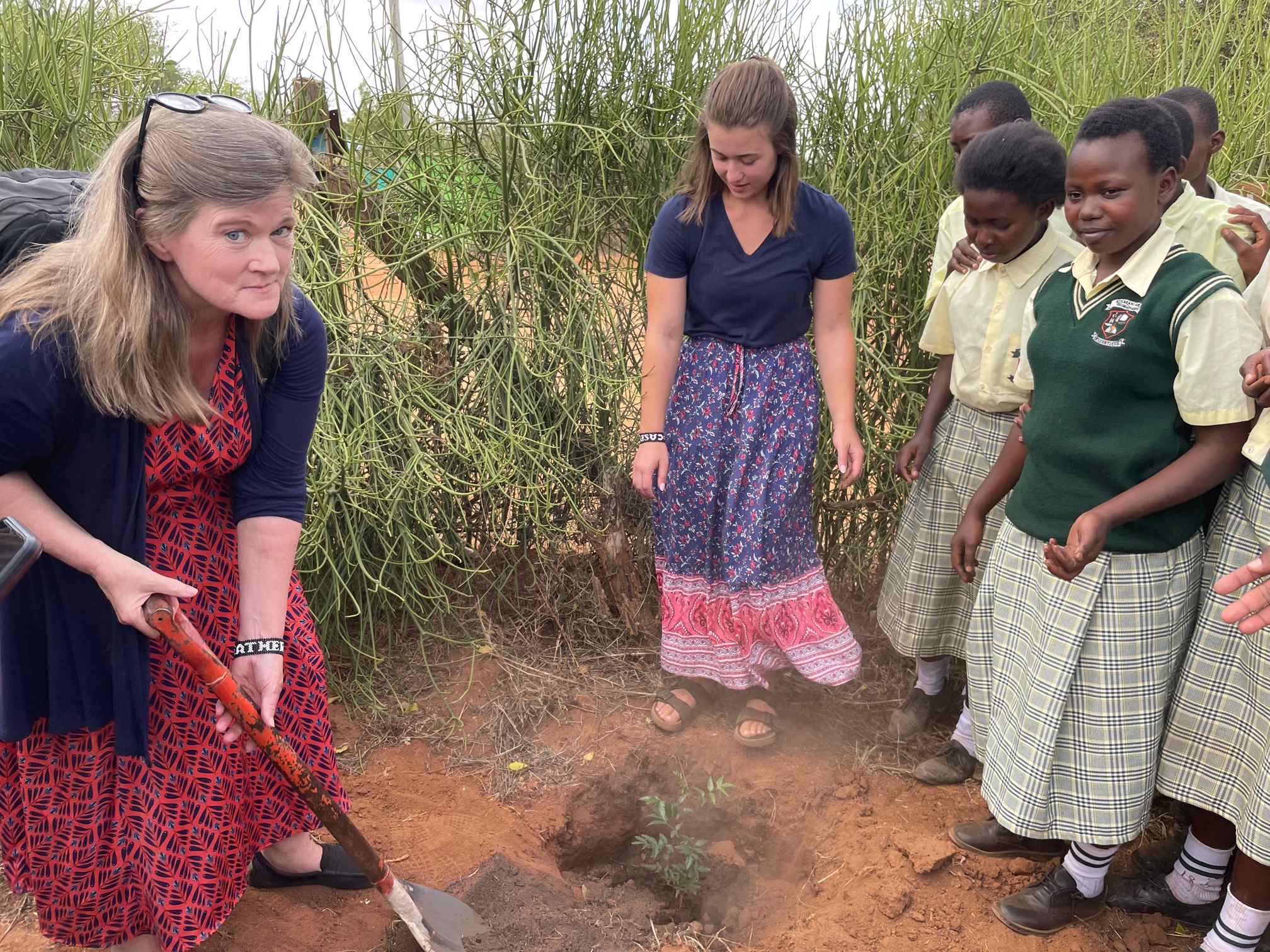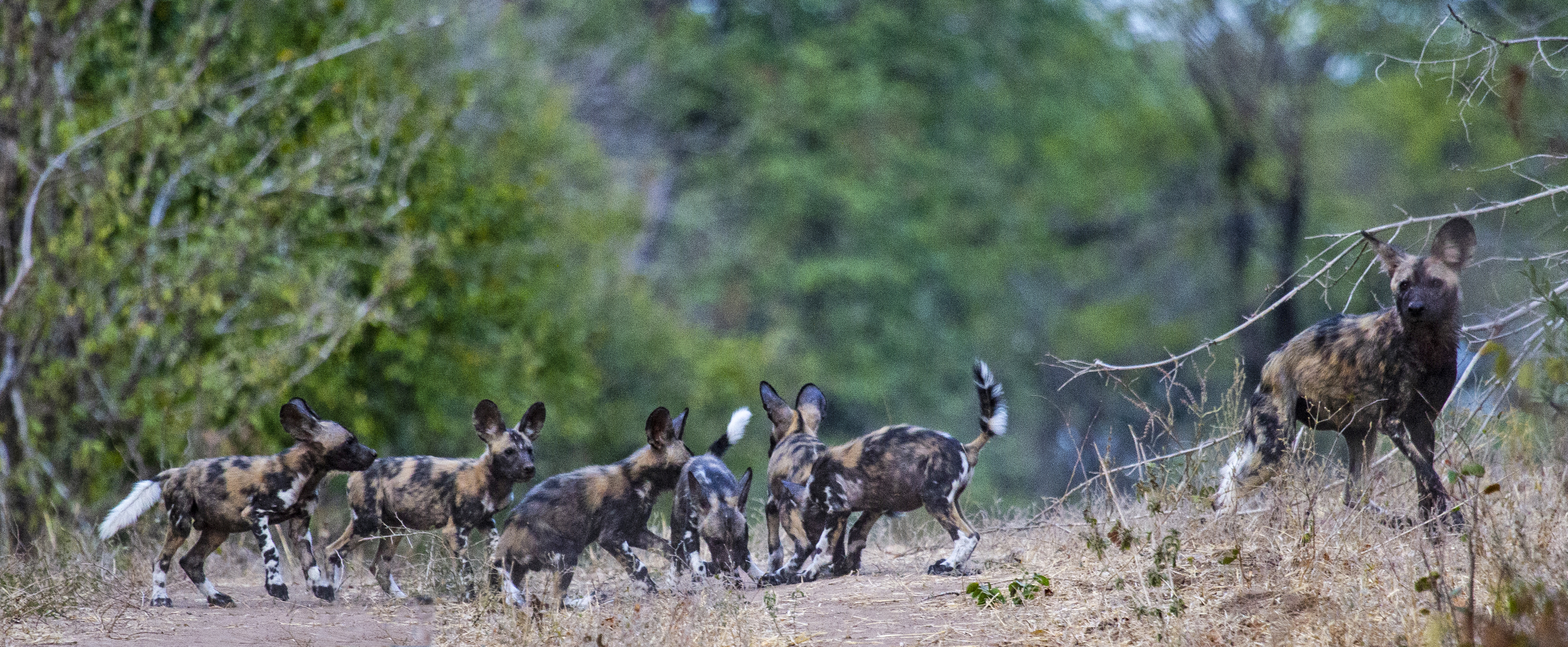MNR students team up with international NGO to help support conservation of the endangered African painted dog
September 13, 2022

By Lindsay Key
When graduate students in Virginia Tech’s Master of Natural Resources (Online) program first signed up for an elective Adaptive Management course taught by Dr. Heather E. Eves, they did not expect to walk away from the course with experience as professional consultants.
During the Spring 2022 semester, the students met regularly via Zoom with the leadership team of the Painted Dog Research Trust (PDRT), a non-profit organization located in Victoria Falls, Zimbabwe. The trust is committed to conserving the African painted dog, also known as the African wild dog or Cape hunting dog, which is a pack animal with scattered populations throughout pockets of Africa. Habitat fragmentation, loss of prey, conflict with ranchers, infectious disease, and pressure from tourism are just some of the threats that have driven the dog’s decline and listing as endangered by the IUCN Red List.
Under Eves’ guidance, students met with the organization’s leaders to walk them through the adaptive management practice: a standardized strategy for planning, monitoring, implementing, analyzing, learning from, and adapting conservation projects. They recommended ways to adjust current monitoring and evaluation strategies to be more robust and effective based on what they learned in class. In turn, they learned from the organization about the challenges of implementing conservation planning in the field, and what it takes to operate a successful research trust.
“Having this collaboration was an essential step for PDRT to move forward with getting a fully populated Miradi evaluation model which will facilitate us to compile a strategic plan,” said Dr. Greg Rasmussen, founder and executive director of the Painted Dog Research Trust. “It was also good to be able to share with students some of the ‘on the ground’ challenges, and how these often undermine what are seemingly straightforward conservation solutions.”

Cultivating experiential learning opportunities in the online classroom
Students’ work with the Painted Dog Research Trust is just one example of a partnership that Eves has created during her more than ten years as an Associate Professor of Practice with Virginia Tech’s Center for Leadership in Global Sustainability, teaching in the MNR program. The master’s degree was developed with working professionals in mind, and one of the aims of the program is to connect students with real-world opportunities for career growth in the sustainability field.
Eves—one of 21 coaches certified to train conservationists in adaptive management through the Conservation Coaches Network—has also worked as a professional consultant for multiple conservation organizations, including Conservation International and the Wildlife Conservation Society.
One fact she has learned in her twenty plus years of teaching and coaching experience is that people learn best by doing.That’s why she incorporates two practical case study applications into her Adaptive Management course.The first is a case study examining monitoring and evaluation of horseshoe crabs, which the class works through together. The second case study is completed in groups, and the group decides the topic. Most of the second case studies involve interacting with an external group, and Eves estimates that students have worked with dozens of conservation groups since she began teaching the course in 2010.
“Often, our students already work for employers in the conservation community, so they already have a project they’d like to build a plan around, and they pitch this idea to the class to form a group,” said Eves. “Other times, I learn of potential clients through my coaching network, and there is an opportunity to pair them with our student groups so that both parties can learn from each other.”
Boosting resumes with real-world experience
During the Spring 2022 semester, three MNR students—Tom Johnson, Caitlin Embly, and Ann Phillips—chose to work with the Painted Dog Research Trust, a group that Eves identified through her own professional network.

“Working with Dr. Rasmussen provided us a unique opportunity to see conservation threats and opportunities at ground level,” said Johnson. “This experience highlighted the importance of understanding both the technical and cultural aspects that surround conservation targets. Not only is Dr. Rasmussen an expert on the African painted dog, he also strives to understand and make connections with community members in the region. By following the adaptive management steps, we were able to work with him to explicitly state visions and goals and to unpack the complexities surrounding painted dog conservation.”
It's no surprise that Eves, who has long emphasized the importance of standardized monitoring and evaluation practices to ensure continuous improvement for conservation projects, also takes this approach with her classes. At the end of the course, she asks students to reflect on how they perceived adaptive management going into the course, and what they think now. These reflections help Eves to continue to refine the course for optimum student experience.
While reflecting on her time working with the Painted Dog Research Trust, Embly wrote that she first thought that conservation plans were developed strategy-first with little regard to on-the-ground analysis. “I thought most of these organizations focused mainly on a given tactic based upon the strengths of their staff and their expertise,” wrote Embly. “Now I realize how much more thought and effort must go into developing these goals and strategies. It really does require a team effort and must involve all the relevant stakeholders, from local officials and community members to government agencies to scientists, and other non-profits. It was also really interesting to realize that you do not have to be an expert to work on one of these plans; experience in many different fields and areas is welcome and helpful!"


